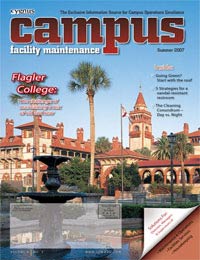|
  Summer 2007—Flagler College, St. Augustine, Fla., has only hosted students for the last 40 years. However, 1968 was not the beginning for this historic location. In fact, the main building, which today hosts residence halls, administrative offices, and the dining hall, was built in 1888 by Henry Morrison Flagler. Summer 2007—Flagler College, St. Augustine, Fla., has only hosted students for the last 40 years. However, 1968 was not the beginning for this historic location. In fact, the main building, which today hosts residence halls, administrative offices, and the dining hall, was built in 1888 by Henry Morrison Flagler.
The industrialist, railroad pioneer, and oil magnate – Rockefeller was one of his business partners – conceived of and built the structure as a luxury hotel designed to lure the rich and famous south for holidays. The building launched the careers of architects John Carrere and Thomas Hastings. Thomas Edison himself helped make it the first building in Florida wired with electricity, and Louis Comfort Tiffany decorated the building’s interior with stained glass, mosaics, and several commissioned murals.
Lawrence Lewis, Jr., Henry Flagler’s principal heir, was the driving force behind the development of Flagler College. The philanthropist envisioned a small, private liberal arts college on the grounds of the old hotel. It opened as a women’s college, and was reorganized as co-educational in 1971. Lewis served as chairman of the Board of Trustees of Flagler College during these early years, from 1968 to 1988.
New and Improved
According to the college, the hotel was sold when the Flagler College institution was founded in 1968. Since then, it has spent more than $43 million restoring the campus and adding new buildings. One of the latest additions to is a multimillion-dollar Student Center on Sevilla St. The college has also developed a 19-acre athletic field two miles from campus.
In addition, the school recently announced yet another new building – a new art gallery, to be called the Crisp-Ellert Art Museum. The $900,000 museum will be located at 48 Sevilla St. between the Proctor Library and the Student Center. The gallery construction also follows a renovation and addition to the Molly Wiley Art Building, a $5.7 million project that will feature new studios, offices and more. The museum will provide 1,400 sq. ft. of additional gallery and reception space to the $1.5 million property recently donated to the college by Robert Ellert and JoAnn Crisp-Ellert. The couple decided to give their 19th-century home and adjoining art studio to the college shortly before Crisp-Ellert’s death in January.
Unique Challenges
With a mix of newer and older buildings, Vic Cheney, plant superintendant for the school, and head of maintenance, has his hands full. He came to the school after working for Georgia Pacific as a Process Engineer for twenty years. Downsizing gave him the opportunity to focus on something different. "I have always been fascinated by the beauty of Flagler College, and now I am able to play a part in taking care of it," he noted.
It was a big job, taking over the maintenance of the school, and, Cheney notes, in the first few months, he wondered, "How will I remember where all electrical breakers and plumbing shut off valves are?" Fortunately, he had the previous plant superintendant on hand, who continues to work part time, and is available to answer questions. "He is a great help, inspiration and friend to me. I was able to evaluate the needs of the crews, provide them with the tools they needed for their specific tasks, and establish crew leaders early on. This helped a great deal in establishing trust from the employees and securing productivity and moral."
Every three years, Cheney and his team perform a facility conditions needs analysis, ranking everything on a scale of one to three, to help them determine what to upgrade, and when.
Some of the systems they have targeted have been the HVAC for the main campus buildings, including high efficiency compressors, digital controls and variable speed pumps. Right now, they are in the process of introducing an MMS they hope will provide better tracking of critical PM items, and improved communication with students and administrators as to when repair requests will be completed.
To further ensure the school stays on track, Cheney meets with the Manager of Business Services and President of the college regularly. "I feel that I can talk to either anytime I need to. We also have monthly information meetings. This gives everyone a chance to hear what our individual priorities are," he noted.
Cheney knows that it all comes down to the students. "The reason we have staff is because we have students," he notes. To ensure every student has a positive experience, he tells his staff "not to be afraid of coming up with a better way to do the daily routines. Be inventive. Treat every individual with respect in every situation. Watch out for each other. We want to be remembered as a comfortable place away from home. I have fond memories of the college that I attended, and would like the same for Flagler students."
Looking to the Future
Cheney knows that for the school to succeed, it needs to stay ahead of the trends. While there are practical concerns he has to deal with — he noted that products that will hold up to the traffic are a big concern, along with the carpet, doors, door hardware, and roofing which all must be constantly evaluated and replaced — there are long-term issues that must be dealt with. He looked at some of the top concerns in the industry today, ranking them as he sees their importance:
1. Becoming a more socially-responsible institution: "We strive to be a good neighbor in the community."
2. Training and education (both internal and external): "New ideas and tools are developed every day. We need to know what they are."
3. Building relationships with vendors, employees and customers: "Relationships are always important for both parties to succeed."
4. Combining safety and health with aesthetics and functionality.
5. Lessening building downtime.
6. Using fewer resources and increasing employee productivity: "I am very fortunate to have a maintenance team that takes pride in helping students and staff quickly and completely. This is accomplished through team work and great ideas."
7. Maximizing efficiency of shrinking budgets (doing more with less): "We are lean and mean, but careful not to become lean and anemic."
|


